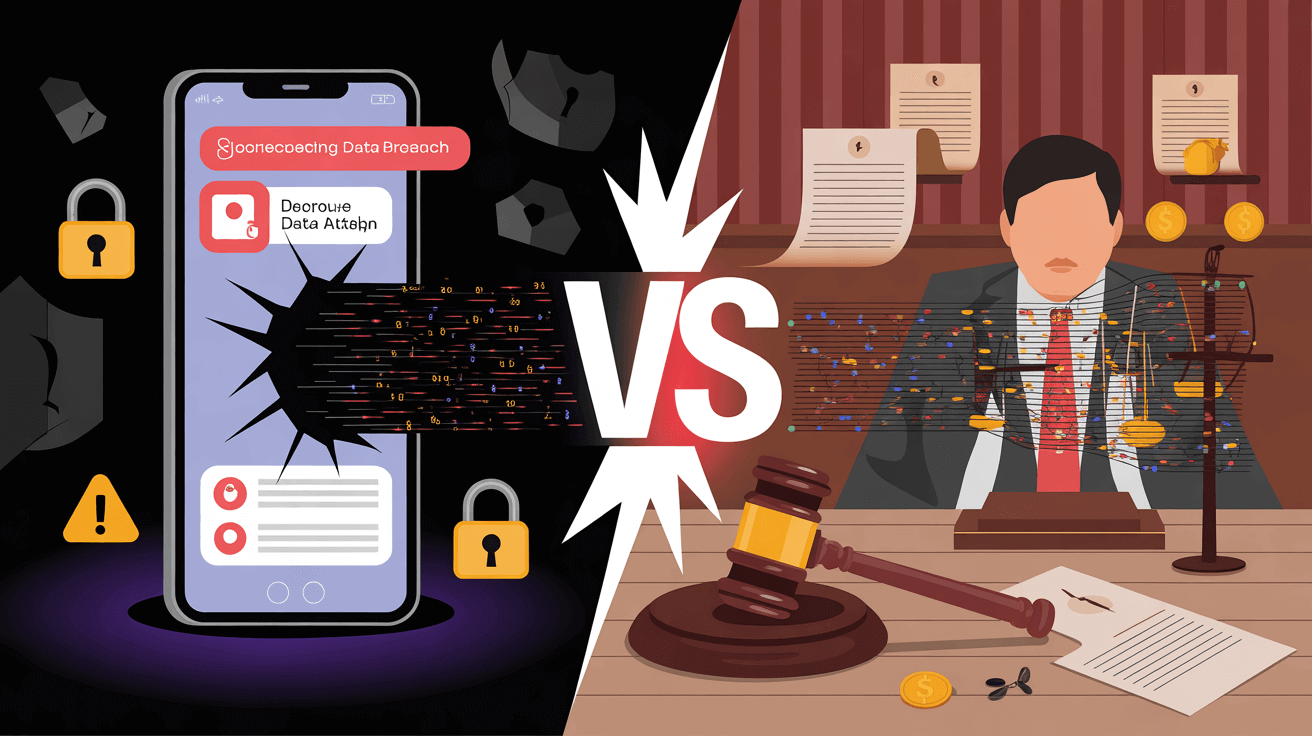The Tea app’s catastrophic data breach isn’t just another cybersecurity headline—it’s a stark warning about app security breach consequences that every tech company should fear. When hackers dumped 72,000 user images and over one million private messages online, they didn’t just expose personal data. Furthermore, they unleashed a legal nightmare that could reshape how we think about digital privacy and corporate accountability.
This app security breach consequences story began when Tea, the women-only dating safety app, hit number one on Apple’s App Store. However, within days, the company found itself drowning in class-action lawsuits and facing millions in potential damages. Let’s dive into what happened and why it matters for every tech company handling user data.
The Tea App Data Breach: What Actually Happened
The Scale of the Privacy Catastrophe
Tea’s security failure exposed an alarming amount of sensitive information. According to cybersecurity experts, the breach included 13,000 user selfies and photo IDs, plus 59,000 images from posts and direct messages. But that’s not all—researchers later discovered access to more than one million private messages spanning from early 2023 to July 2025.
The app required users to submit selfies and government-issued IDs for verification, promising these photos would be “deleted immediately following the completion of the verification process.” However, the leaked data directly contradicted this claim, containing information from users who signed up before February 2024.
How the Breach Unfolded
The attack didn’t happen overnight. Instead, hackers exploited an unsecured database on Google’s Firebase platform, accessing what Tea called a “legacy data storage system.” Moreover, the breach gained momentum after 4chan users organized a “hack and leak” campaign against the app.
The timing couldn’t have been worse for Tea. As the app went viral, attracting over 4.6 million users, hackers were simultaneously dumping user data on notorious message boards known for harassment and revenge tactics.
App Security Breach Consequences: The Legal Tsunami
Class-Action Lawsuits Emerge
California resident Griselda Reyes filed the first major class-action lawsuit on July 29, 2025, seeking to hold Tea responsible for the “massive and preventable cyberattack.” The lawsuit doesn’t just target Tea—it also names X (formerly Twitter) and 4chan for allegedly failing to remove the leaked data quickly enough.
Plaintiffs can seek statutory damages of $100 to $750 per violation under the California Consumer Privacy Act (CCPA), plus actual damages. With millions of affected users, these app security breach consequences could result in settlements reaching hundreds of millions of dollars.
Potential Settlement Amounts
Based on recent data breach settlements, Tea faces staggering financial exposure. AT&T recently agreed to pay $177 million to settle lawsuits over their 2024 data breaches, while Anthem Inc. paid $115 million in the largest data breach settlement in history.
Given Tea’s smaller size compared to these telecommunications giants, the company could still face settlements in the tens of millions. Legal experts suggest that app security breach consequences for startups can be particularly devastating since they often lack the financial resources to weather major litigation.
Real-World Impact on Users
Identity Theft and Financial Fraud Risks
The stolen data creates a perfect storm for cybercriminals. As cybersecurity expert Richard Blech warned CNN, the combination of selfies and ID photos provides a “data goldmine” for AI-driven attacks including facial recognition spoofing, biometric bypassing, and deepfake creation.
Users face immediate risks including:
- Identity theft using stolen ID photos
- Account takeovers through facial recognition spoofing
- Financial fraud targeting exposed personal information
- Harassment and doxxing from leaked private messages
Long-Term Privacy Implications
Unlike passwords that can be changed, biometric data stolen in this breach “isn’t going to expire,” according to security experts. This means affected users could face ongoing vulnerability for years to come, requiring constant vigilance over their credit reports and financial accounts.
App Security Breach Consequences for the Tech Industry
Regulatory Scrutiny Intensifies
The Tea breach demonstrates how quickly app security breach consequences can spiral beyond company control. Regulators are taking notice, with the California Privacy Protection Agency likely to investigate whether Tea’s security measures met legal standards.
Additionally, this incident highlights systematic issues in app development where startups prioritize rapid growth over robust security. Many companies rely on “legacy systems” that become ticking time bombs as user bases expand.
Financial Impact Beyond Settlements
The true cost of app security breach consequences extends far beyond legal settlements. Companies typically face:
- Investigation and remediation costs
- Credit monitoring services for affected users
- Regulatory fines and compliance audits
- Lost business and customer attrition
- Insurance premium increases
- Brand rehabilitation expenses
Studies show that 29% of businesses experiencing data breaches lose revenue, with 38% of those companies seeing losses of 20% or more.
Practical Steps to Avoid Similar Disasters
Implement Security from Day One
Tech companies can learn crucial lessons from Tea’s mistakes. First, never treat security as an afterthought or something to address “later.” Implement encryption, access controls, and regular security audits from your app’s launch.
Second, establish clear data retention policies and actually follow them. If you promise to delete user data, make sure your systems automatically purge it according to your stated timeline.
Create Comprehensive Incident Response Plans
Having a legally vetted breach response plan can significantly reduce app security breach consequences. Your plan should include:
- Immediate containment procedures
- Legal notification requirements and timelines
- Customer communication strategies
- Forensic investigation protocols
- Regulatory compliance checklists
Future Implications for Tech Companies
The New Reality of Privacy Litigation
The Tea breach signals a shift in how courts and regulators view app security responsibilities. With data breaches affecting over 1 billion records in 2024 alone, legal frameworks are tightening rapidly.
Furthermore, specialized privacy litigation firms are becoming more aggressive in pursuing app security breach consequences. Law firms like The Swigart Law Group and Pacific Trial Attorneys actively seek out breach victims to build class-action cases.
Insurance and Investment Implications
Venture capitalists and investors are now scrutinizing security practices more carefully before funding startups. The potential for massive legal liability from app security breach consequences makes robust cybersecurity a business necessity, not just a technical requirement.
Cyber liability insurance premiums are also rising sharply for companies with poor security track records. Some insurers now require security audits and compliance certifications before issuing policies.
Regulatory Evolution
Expect stricter regulations governing app security, particularly for platforms handling sensitive personal data. The Tea incident will likely influence future legislation requiring enhanced verification of security claims and mandatory security audits for apps collecting biometric data.
Moreover, regulators may impose stricter penalties for misleading privacy policies. Tea’s promise to delete verification photos while actually retaining them for years could set precedents for false advertising claims in privacy contexts.
Protecting Your Business from App Security Breach Consequences
Technical Safeguards
Implement multi-layered security including end-to-end encryption, regular penetration testing, and automated vulnerability scanning. Additionally, adopt zero-trust security principles and limit data access to essential personnel only.
Legal Protections
Work with privacy attorneys to ensure your terms of service and privacy policies accurately reflect your data practices. Furthermore, invest in comprehensive cyber liability insurance and maintain detailed security documentation to demonstrate due diligence.
Cultural Changes
Make security everyone’s responsibility, not just the IT department’s. Train employees on data handling best practices and create accountability measures for security compliance across all levels of your organization.
The Bottom Line
The Tea app’s downfall serves as a sobering reminder that app security breach consequences can destroy companies overnight. With potential settlements reaching nine figures and regulatory fines climbing yearly, the cost of poor security far exceeds any upfront investment in robust protection.
Moreover, as privacy laws evolve and litigation becomes more sophisticated, tech companies can no longer afford to treat security as optional. The question isn’t whether your app will face security challenges—it’s whether you’ll be prepared when they arrive.
This case will likely influence how courts evaluate app security breach consequences for years to come. Companies that learn from Tea’s mistakes and invest in comprehensive security frameworks will not only protect their users but also safeguard their own survival in an increasingly litigious digital landscape.
Meta Description: “Tea app’s data breach sparked massive lawsuits. Learn about app security breach consequences and how tech companies can protect themselves from legal disasters.”








